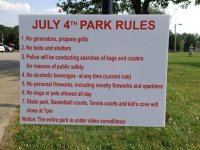speedrrracer said:
Frank Ettin said:
Does a person have a reasonable expectation of privacy? Arguably, if a prominent public notice is given that bags, packages, coolers, etc. of persons entering a certain place, like a public park, a person doing so would have no reasonable expectation that the contents of such things would be private...
In general, are expectations are governed primarily by signage?...
Actually, yes. The sign communicates something and thus tells you what you can expect. If a sign says "wet paint", you have no grounds upon which to complain if you touch the thing the sign is on and get paint on your finger -- because given the information on the sign you have can have no reasonable expectation otherwise.
In the body of decisional law discussing the scope of Fourth Amendment protection and what may constitute an unreasonable search, the notion of one's reasonable expectations of privacy is a consistent theme under a variety of circumstances.
speedrrracer said:
...Would a sign posted on a public road saying my car can be searched alter my legal expectations?...
It should. Why would you believe the sign is lying? And there are a number of examples of such signs on public roadways being given effect.
For example, traveling between Northwest Arizona and Southwest Nevada, before the Hoover Dam bypass was opened, often involved traveling over a public highway over Hoover Dam. That stretch of public highway was posted to the effect that vehicles were subject to search, and they were from time to time searched. One would have done well to believe the signs.
For another example, vehicles can be subject to search at agricultural check-points on public highways between various States.
speedrrracer said:
Frank Ettin said:
And if one refuses that worst that will happen to him is that he won't be allowed in the park.
Did you mention this because the gravity of the "worst thing" matters in a legal determination of what is / is not a violation of your civil rights, or did you mention it for other reasons? ...
I mention it because courts have considered inconvenience and disruption as factors in determining reasonableness for Fourth Amendment purposes.
speedrrracer said:
Frank Ettin said:
Is there a reasonable and articulable public safety related purpose for the search? Of course there is.
This is probably incorrect, but if someone were fighting the Constitutionality of this park policy, and saying it was a violation of their 4A rights, wouldn't the state have to meet a stricter level of scrutiny than having a nebulous safety-related reason?
Why?
First, the right protected by the Fourth Amendment is to be secure from
unreasonable search.
Second, a public safety concern over the contents of bags or coolers is hardly nebulous, especially in light of the recent events at the Boston Marathon.
Third, see post 16.

